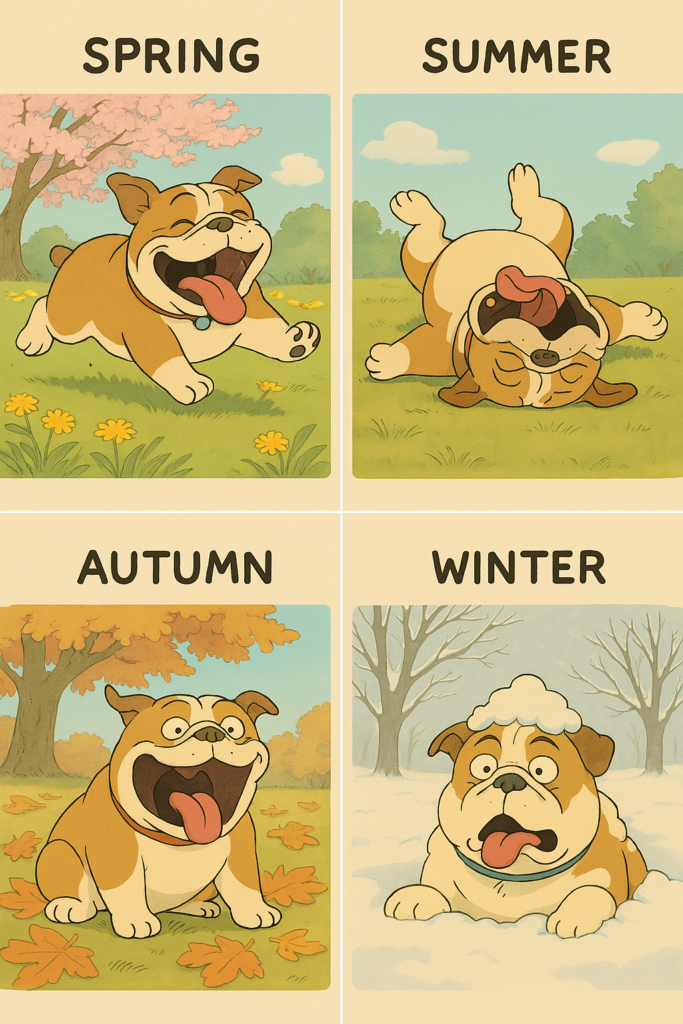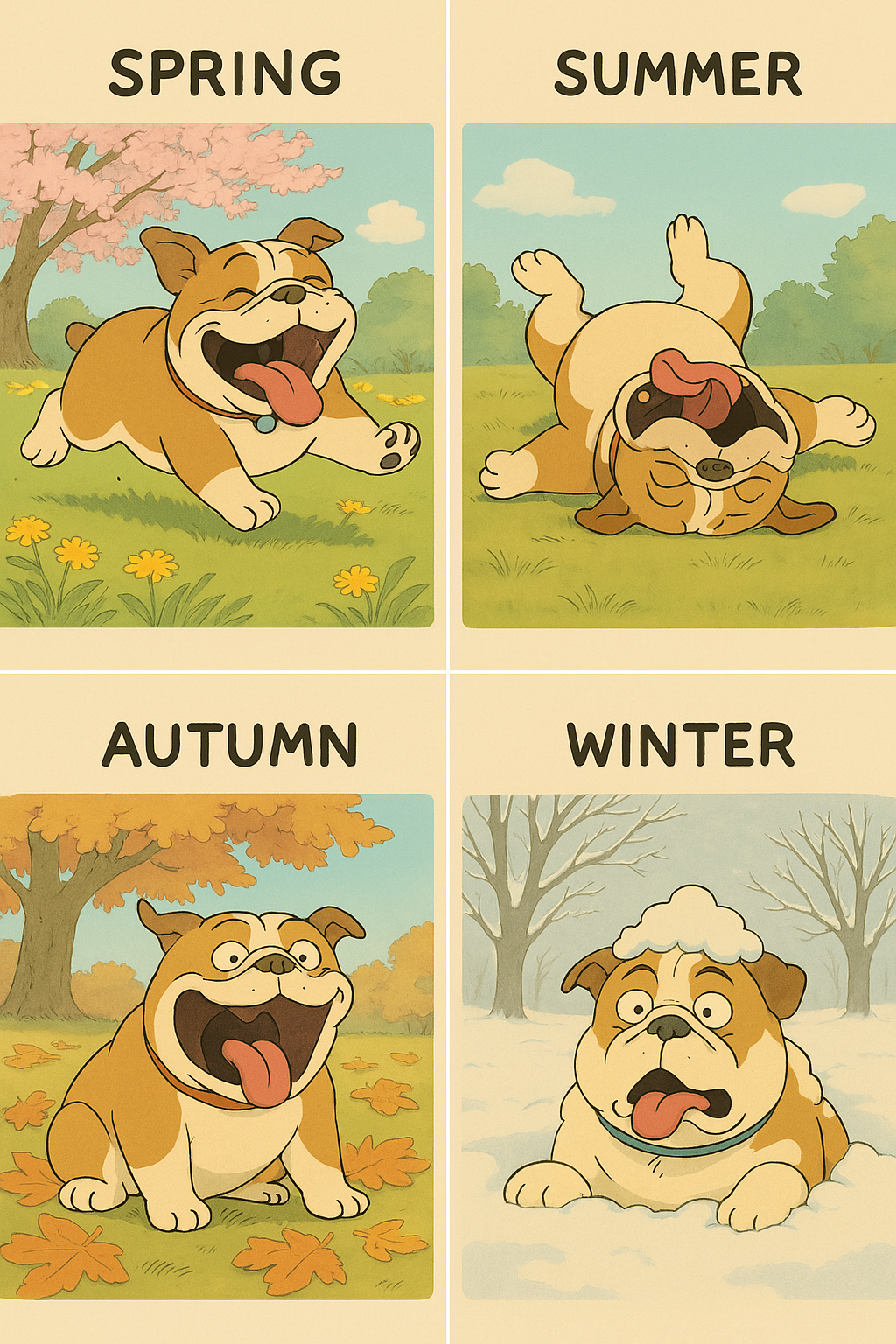Your cart is currently empty!

Seasonal Health Changes in Bulldogs: What to Watch for Year-Round
Bulldogs are lovable and loyal, but their unique anatomy and sensitive systems make them particularly vulnerable to seasonal health shifts. Whether it’s allergy flare-ups in spring, overheating in summer, or dry skin in winter, Bulldogs need year-round attention to stay healthy and comfortable.
This guide will help you understand how each season impacts Bulldog health, the signs to watch for, and prevention tips to keep your pup thriving no matter the weather.
Spring Health Concerns for Bulldogs
Common Issues:
- Environmental Allergies
- Pollen from trees, grasses, and flowers can trigger itchy skin, watery eyes, and sneezing.
- Bulldogs are particularly prone to atopic dermatitis.
- Pollen from trees, grasses, and flowers can trigger itchy skin, watery eyes, and sneezing.
- Flea & Tick Season Begins
- Moist, warming weather invites fleas and ticks. Bulldogs’ folds and tail pockets are prime hiding spots.
- Moist, warming weather invites fleas and ticks. Bulldogs’ folds and tail pockets are prime hiding spots.
- Mold and Spore Sensitivity
- Damp spring environments can worsen skin irritation and ear infections.
- Damp spring environments can worsen skin irritation and ear infections.
Symptoms to Watch:
- Excessive scratching or licking
- Chewing paws
- Skin redness or hot spots
- Sneezing, coughing, runny nose
Prevention & Management:
- Begin flea/tick prevention early (e.g., NexGard, Seresto collars).
- Wipe paws after walks to remove allergens.
- Bathe with hypoallergenic or medicated shampoos.
- Add omega-3 supplements to help skin barrier.
Summer Health Concerns for Bulldogs
Common Issues:
- Heatstroke
- Bulldogs cannot regulate heat efficiently due to brachycephalic (short-nosed) anatomy.
- Even short walks in hot weather can be dangerous.
- Bulldogs cannot regulate heat efficiently due to brachycephalic (short-nosed) anatomy.
- Dehydration
- Thick coats and flat faces make Bulldogs more susceptible.
- Thick coats and flat faces make Bulldogs more susceptible.
- Hot Spots
- Moisture and heat lead to skin infections, especially in folds.
- Moisture and heat lead to skin infections, especially in folds.
- Sunburn
- Light-colored Bulldogs can get sunburned on ears, nose, and belly.
- Light-colored Bulldogs can get sunburned on ears, nose, and belly.
Symptoms to Watch:
- Excessive panting
- Lethargy or collapse
- Bright red gums or tongue
- Vomiting or drooling
- Rapid heartbeat
Prevention & Care:
- Limit outdoor time during mid-day.
- Always provide shade and cool water.
- Use cooling vests or mats.
- Apply dog-safe sunscreen to exposed skin.
- Never leave in parked cars—even for minutes!
Fall Health Concerns for Bulldogs
Common Issues:
- Joint Pain and Stiffness
- Drop in temperature may worsen arthritis or joint issues common in Bulldogs.
- Drop in temperature may worsen arthritis or joint issues common in Bulldogs.
- Ragweed and Mold Allergies
- Late-blooming plants and falling leaves harbor allergens.
- Late-blooming plants and falling leaves harbor allergens.
- Dietary Changes
- Transitioning to heavier foods or lower activity can affect weight and digestion.
- Transitioning to heavier foods or lower activity can affect weight and digestion.
Symptoms to Watch:
- Morning stiffness
- Reluctance to exercise
- New skin irritation
- Sneezing and postnasal drip
Prevention Tips:
- Increase joint support supplements (e.g., Dasuquin, fish oil).
- Warm up before walks and add light stretching.
- Maintain consistent indoor humidity.
- Keep your dog’s sleeping area cozy and draft-free.
Winter Health Concerns for Bulldogs
Common Issues:
- Dry Skin & Paw Cracking
- Cold, dry air strips moisture from skin and paws.
- Cold, dry air strips moisture from skin and paws.
- Hypothermia & Frostbite
- Bulldogs have minimal insulation and shouldn’t be left in the cold.
- Bulldogs have minimal insulation and shouldn’t be left in the cold.
- Less Exercise → Weight Gain
- Cold weather leads to inactivity, increasing the risk of obesity.
- Cold weather leads to inactivity, increasing the risk of obesity.
- Indoor Irritants
- Heating systems dry air and can trigger respiratory issues.
- Heating systems dry air and can trigger respiratory issues.
Symptoms to Watch:
- Flaky skin, dandruff
- Cracked or bleeding paw pads
- Shivering or curling into tight balls
- Decreased activity or weight gain
Winter Care Strategies:
- Use paw balm or protective booties during walks.
- Add humidifiers indoors.
- Adjust feeding if exercise drops.
- Try indoor games or short sessions of treadmill walking.
Bulldog Seasonal Health Checklist
| Season | Focus Area | Action Items |
| Spring | Allergies, Fleas | Wipe paws, start preventatives, allergy diet |
| Summer | Overheating, Hydration | Walk in shade, never overexert, offer cooling mats |
| Fall | Joints, Mold | Warm-ups, joint chews, clean up leaf piles |
| Winter | Dry Skin, Inactivity | Moisturizing balm, indoor exercise, watch calories |
Bonus: Year-Round Supplements for Seasonal Support
| Supplement | Benefit | Season |
| Omega-3 (Fish Oil) | Skin & joint health | All Seasons |
| Glucosamine/Chondroitin | Joint support | Fall & Winter |
| Probiotics | Digestive & immune support | Year-round |
| L-theanine or CBD | Calming during thunder/fireworks | Spring/Summer |
Final Thoughts
Each season brings a unique set of health challenges for Bulldogs. By staying aware of weather-based changes, keeping up with preventive care, and adjusting your Bulldog’s routine and environment, you can ensure your pup thrives all year long. Thank you for reading Seasonal Health Changes in Bulldogs.
Is Your Dog’s Food Actually Killing Him?
(New Research Shocks Vets Everywhere)
Did you know that your dog is supposed to live at least 5 years longer than the average expectancy?
Truth is, your best friend’s life is cut short by the darkest secret of the pet industry…
Latest research shows how this popular brand of dog food…
Which promises to get your dog in good shape and keep him healthy and full of energy…
Is actually cutting your four-legged buddy’s life short by a third.
Vets are appalled by this research, as most of them have been unknowingly recommending this dog food brand to 8 out of 10 dogs…
Watch the video below to see which food you should never feed your dog if you want to extend his life by at least 5 years.
